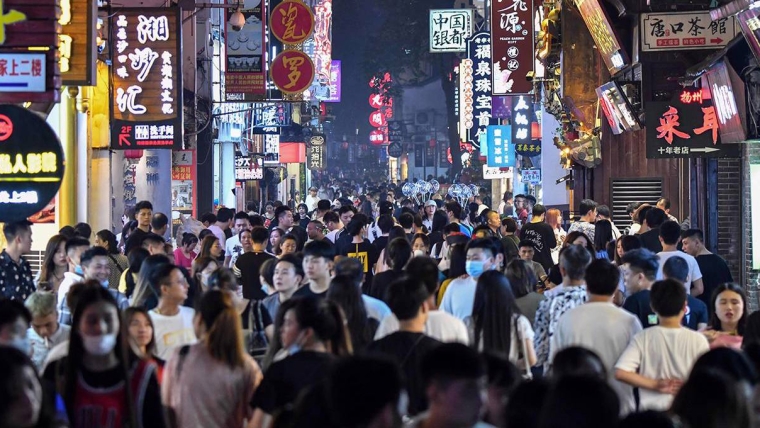
In just four decades, China’s economy has achieved an unprecedented level of wealth and development, and, until recently, its upward trajectory of economic growth and prosperity seemed set to continue. But as political pressures and the coronavirus push many countries – particularly the United States – to embrace more nationalist policies, the heyday of globalisation soon could be replaced by a post-pandemic era shaped by national-security concerns and border controls.
This is not good news for China, which would prefer that the world maintain the economic openness it achieved in recent decades. For that reason, China had been working hard to align its economic and trade activities with international rules and norms. But now it seems that China must prepare for a future characterised by higher trade barriers and restrictions.
To this end, China’s 14th Five-Year Plan makes clear that the country will seek to reduce its dependence on external demand. The “dual-circulation strategy” announced in the plan instead emphasises reliance on the country’s huge population. China also plans to invest heavily in cutting-edge sectors, such as artificial intelligence and semiconductors, and work to achieve self-sufficiency in core technologies.
Outsiders are deeply suspicious of China’s moves to increase state control over its economic development, such as imposing new regulations on tech companies and capital markets. They fear that the country is prioritising its geopolitical objectives over the quest to build a market economy. Some even worry that China will return to the development model that predominated before Deng Xiaoping launched the country’s “reform and opening up.”
These fears are overblown. China is unlikely to return to a state-controlled economy or enact isolationist policies. Instead, the increased role of the state in the economy and a shift toward self-reliance should be interpreted as a response to a changing – and, at times, hostile – external environment.
This shift likely would have happened even if Sino-American relations had not deteriorated as they have, owing to China’s enormous population. Recognising the potential of its own massive internal market, China’s leaders have long sought to increase domestic demand as a hedge against external changes. As for technological progress, a larger population implies more talent and higher returns for innovation.
But, amid the retreat from globalisation, China’s advantage may be even greater. In a 2018 paper, Klaus Desmet, Dávid Krisztián Nagy, and Esteban Rossi-Hansberg showed that in a world of restricted cross-country trade and migration, countries with large populations can provide more opportunities to increase economic output through internal trade and specialisation.
The most populous countries are not necessarily the richest today, the authors note, largely because of migration. But if barriers to migration grow high enough, populous countries will outpace smaller countries in innovation, even if the latter are richer. Because long-run growth is driven by improvements in technology, this translates into a major economic advantage for countries with larger populations. This outcome highlights just how self-defeating America’s turn inward is: it’s clear that America’s success is thanks to migration and globalisation.
To be sure, China is facing strong demographic headwinds: its birth rate dropped to a record low in 2020. But the effects of this decline will take a few decades to have an impact. China’s demographics today give the country a significant advantage over the US in terms of human capital for at least the next 20 years. Projections of China’s future growth suggest that if China makes the most of this advantage – as it seems poised to do – the US will find it all but impossible to hamper China’s economic progress. Rather than thwarting China’s ambitions, America’s policies will encourage China to continue hedging its bets, including by rethinking its national-security strategy and shifting more resources to its science and technology sectors. In the worst decoupling scenario, the world’s two largest economies will end up dominating their own technology-supply systems, each with its own rules and standards.
This is a distinct possibility. But visionary politicians should appreciate how much more could be achieved on both sides if the countries instead worked together. The US would be far better served by seizing the opportunities China’s rise creates. And, while China’s large population affords it a major advantage in a deglobalised world, it still has a lot to learn from more advanced economies, beginning with the US. China remains a developing economy, after all, with a per-capita GDP amounting to just one-quarter of the OECD average.
More broadly, while a more populous country has a large domestic market to fall back on, that is no substitute for access to the global market. Likewise, ties to the outside world, including the sharing of knowledge and ideas, invariably accelerate technological progress. And an open and decentralised economic system that encourages market-led activity is far more conducive to the iterative process vital to the commercialisation of innovation.
It’s clear that China has much to gain from a more open global economic system. China’s leaders have emphasised that they are not abandoning the path of market-led development and returning to a closed economic model – and there is no reason to believe otherwise.
Zhang Jun is Dean of the School of Economics at Fudan University and Director of the China Center for Economic Studies, a Shanghai-based think tank. Copyright 2021 Project Syndicate, here with permission.
5 Comments
""In just four decades, China’s economy has achieved an unprecedented level of wealth and development"" One precedent would be NZ in the 1800s. By1900 NZ was top country by GDP per capita (that is the measure citizens appreciate) alongside the USA and Argentina. Note the changes in relative prosperity since.
China is very impressive. I watch Chinese dramas and Shanghai and Bejing's infrastructure makes NZ embarrassingly pitiful. But the wealth is badly spread; almost every other Chinese TV drama hinges of loved relatives requiring expensive health care whereas my daughters have no worry about being forced into a marriage so they can pay for their grandmother's cancer treatment.
I wonder how many Han Chinese living in Taiwan, Singapore or California would prefer living in China?
The author is right on one matter - while China sells things the world wants its economy will grow. If the world can accept trading with Saudi Arabia then China doesn't have to worry about organ harvesting of Falun Gong prisoners or concentration camps for Uighurs.
China is depleting the earth's resources, just like everyone else.
Say it as it actually is. It's not 'china', it's 'Xinping's China'. No-one should be supporting these CCP monkeys.
dago,
There is much to dislike about the direction in which China is going, but that is no excuse for using the word monkeys. That kind of gratuitous insult should have no place here.
It may have escaped your attention but China is our largest export market. Are you prepared to see that vanish? Do you have any understanding of the effect that would have on our economy?
Of course, we should not be in that situation, but since we are, how would you suggest we deal with it?
That's right there is no country to replace China as our largest trading partner. As in any business you never upset your best customer.

We welcome your comments below. If you are not already registered, please register to comment
Remember we welcome robust, respectful and insightful debate. We don't welcome abusive or defamatory comments and will de-register those repeatedly making such comments. Our current comment policy is here.